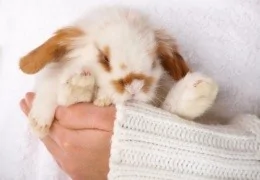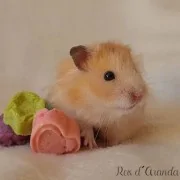The Tornjak originated from genetically homogeneous, almost extinct, indigenous shepherd dogs. These dogs have...
THE "ENCEPHALITOZOO CUNÍCULI" (E.CUNI)
INTRODUCTION
On some occasions, reading in social networking groups about rabbits, we have come across inexperienced owners or hobby farmers asking for help because one of their animals is suffering from vestibular syndrome (often claiming that they do not have an exotic vet nearby or that it has been sudden). Vestibular syndrome can have many causes but, on this occasion, we will focus on the most terrible and the one with the highest probability rate: the "Encephalitozoon Cuniculi" or "E.Cuni".
WHAT IS "ENCEPHALITOZOON CUNICULI"?
Encephalitozoon cuniculi is nothing more than an intracellular parasite that gives a response in very specific cases, affects rabbits and is considered a serious disease. This parasite migrates to different parts of the body when active, such as the brain, eyes, medulla and kidneys (the first two being more common).
It is a pathology that can go unnoticed, as some rabbits do not usually develop symptoms at any time in their lives (they are carriers). E.cuni is transmitted vertically (from mother to offspring via the placenta) or via vectors, such as the urine of rabbits that do show symptoms (active parasite) or through mosquito bites.
SYMPTOMS OF E.CUNI
In general, the symptoms of E.cuni can be very generalised and common, although there are some symptoms that are more representative. It is important to know which symptoms are frequently presented, although the definitive diagnosis is by means of complementary laboratory tests which will confirm if the parasite is active and if the rabbit is or is not a carrier.
Nowadays it is considered that 70% of rabbits in Spain are infected and positive for this parasite, but this does not mean at all that they will develop the disease and the great majority die of old age without developing it.
These are some of the most common symptoms and the affected organ which causes it:
- Tilting of the head with varying degrees of inclination (vestibular syndrome; affected brain).
- Abnormal movement of the eyeball (nigtasm; affected brain)
- Change in eye colour (white pupils; affected eyes)
- Drinking and urinating more than usual (affected kidneys)
- Urinating on themselves, unable to control bladder (affected kidneys)
- Rolling, i.e. spinning around (due to vestibular syndrome; brain affected)
- Flaccid paralysis of the limbs (affected spinal cord)
CAN E.CUNI BE CURED?
To control the disease, symptomatic treatment is used to attack the spores and avoid immunosuppression. The drug of choice is Fenbendazole, an effective antiparasitic used to stop the infection and also as a preventive method in asymptomatic rabbits. In addition, it also prevents contagion.
The treatment does not kill the parasite or cure the disease, but prevents it from replicating in the cells and slows its growth by making it dormant. The symptoms of a rabbit that has been sick may disappear completely or partially, as sometimes there are lifelong sequelae and the rabbit becomes a disabled animal.
HOW TO PREVENT E.CUNI?
The key to this pathology is prevention. However, as we have already mentioned, there is a high percentage of rabbits infected vertically.
For this reason, it is important to have a regular veterinary check-up, so that the appropriate anti-parasitic treatment can be indicated. It is advisable to administer it every 6 months, whether or not there is contact with other rabbits.
Contact with rabbits of unknown origin should be avoided without first having carried out a strict quarantine. Especially because of the high percentage of rabbits positive for this parasite.
Avoid offering herbs and vegetables harvested directly from the field. Remember that these areas are often inhabited by wild rabbits.
On the other hand, as it is the immune system which controls the parasite, it is important to make sure that our rabbit is healthy and strong, not only by providing it with a good diet, but also by keeping its vaccines up to date and controlling the ambient temperature with good air conditioning in summer if necessary (heat lowers its defences). E.Cuni is more likely to affect in very hot weather or animals that are immunocompromised or very old.
Leave a comment
Log in to post comments













